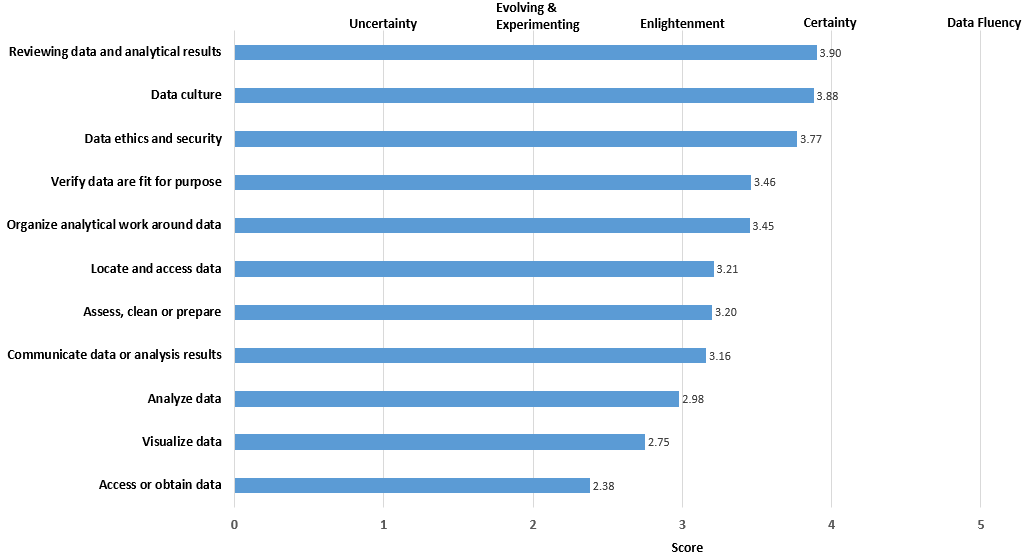Overview
Increasingly, the success of our programs in accomplishing their mission is dependent on recognizing the essential role data has in understanding the populations we serve, the current and emerging challenges those populations face, and providing an objective basis for efficiently and effectively targeting our resources and efforts to those most in need. Data are central to assessing the state of workers and the workforce, developing policy and planning for Department of Labor programs, guiding program administration, and providing transparency into our actions and the impacts that result.
Just as we can optimally guide data governance with inputs from data management maturity models, we can use objective measures of strengths and weaknesses in analytical skills to guide efforts building capabilities to leverage data and enhance data literacy and data culture. Systematic assessment of data skills supports objective evaluation of current capacities, identifies meaningful distinctions in data literacy, recognizes strengths, detects areas for improvement, and outlines a path toward developing and leveraging the necessary skills to use data as a strategic asset.
Skills Assessment Instrument
DOL has conducted comprehensive Skills Assessment that includes five components:
Assessment Results
The skills assessment was conducted with categories similar to those found in a maturity model framework, ensuring people used skill progressions with clearly differentiated tiers to identify their current state. Data skills were assessed in the following areas:
- Ability to obtain, verify, clean, analyze, visualize, communicate, assess, and interpret data
- Perception of organizational data culture
- Awareness of data ethics and security
The maturity scale used to score each area ranged from 1 (low level of data literacy skills) to 5 (data fluency). Levels 2 through 4 identify intermediate steps between lowest to highest, and form a continuum or gradient reflecting incremental progress toward higher levels of data literacy skills.
Assessment results across all data skill generally fell into the evolving or enlightened category. Data management and use skills in which DOL was relatively stronger included reviewing data and analytical results, data culture, and data ethics and security. Data management and use skills in which DOL was relatively weaker included skills associated with accessing or obtaining data, visualizing data, and analyzing data.
| Skill | Score |
| Reviewing data and analytical results | 3.90 |
| Data culture | 3.88 |
| Data ethics and security | 3.77 |
| Verify data are fit for purpose | 3.46 |
| Organize analytical work around data | 3.45 |
| Locate and access data | 3.21 |
| Assess, clean or prepare | 3.20 |
| Communicate data or analysis results | 3.16 |
| Analyze data | 2.98 |
| Visualize data | 2.75 |
| Access or obtain data | 2.38 |
DOL's skill assessment also identified a number of key aspects of talent development and learning modes, which the Data Board has emphasized as core to guide plans for future learning, training, and skill improvement . These findings include:
- Identification of specific areas of training that would have immediate impact and be most practically helpful to DOL staff such as furthering their ability to analyze and visualize data;
- Identification of specific strategic skills that would best support transformation towards a data-informed culture and fostering an environment that supported innovation;
- DOL staff expressed a strong preference for experiential learning models, and specifically learning by doing and performing a series of exercises with known outcomes; and
- The skills assessment also identified some critical limiters to achieving better analytical and data management work. The issues most commonly cited included limitation in data reuse as a result of data quality issues, lack of predictable and consistent data infrastructure to process, combine or stage data for analysis, and the degree to which data produced is suitable and fit-for-purpose to innovate on service delivery.
Using Assessment Results to Guide Improvements
The results of the Skills Assessment reveal that for DOL to continue to improve data acumen and fluency, and leverage data more effectively to inform program administration, greater investment is needed in data governance to improve the quality and suitability of data, data infrastructure to access, obtain, analyze and visualize data, and a data-informed culture that fosters and promotes innovation.
DOL's Office of Data Governance is leading several initiatives to build data skills, culture and capacity, including but not limited to:
- Address validation, standardization, and geocoding efforts to make data interoperable for cross-linkage of records across agency datasets and suitable for geospatial visualization and analysis.
- Developing data infrastructure and services through Application Programming Interfaces (APIs) for agency staff to find, access, and extract data in consistent and predictable ways.
- APIs enable staff to retrieve customizable subsets of data on demand in machine readable formats and to create reusable, automated, and real-time data pipelines that feed into analytical workflows and data-driven dashboards.
- APIs have also enabled ODG to identify data quality issues and work with agencies to understand how to make data more comprehensible and useful.
- Expanding access to enterprise analytical services with a comprehensive approach to prototyping, assessing, maintaining, and deploying software in a manner that maximizes responsiveness to the needs of DOL staff;
- Creating data visualization tools that make it easy for staff of all skill levels to prototype and share important trends and patterns in program impact, stakeholder characteristics, and agency services;
- Establishing communities of practice for analytics, APIs, and data visualization, which promote knowledge sharing, collaboration on best practices, and applied experiential learning exercises to build practical data skills needed for day-to-day agency data operations. These communities have proven to be an effective way to build the data culture at DOL and grow innovative ideas, processes, and products.
- Offering training classes and workshops in using open-source software like R and Python through DOL’s analytical services to prototype interactive data visualization, dashboards, and analytical workflows.
To learn more about DOL’s planning and actions to become a more data-informed organization, read our strategic plan.

